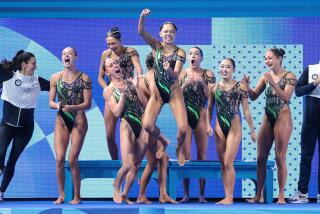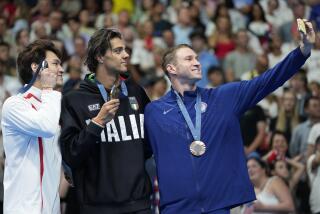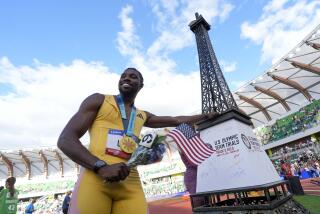SWIMMING U.S. OLYMPIC TRIALS : Jorgensen Romps to Win in 400 Free
- Share via
INDIANAPOLIS — San Diego’s Dan Jorgensen posted the second-fastest time ever by an American in winning the 400 freestyle Wednesday at the U.S. Olympic Trials at the Indiana University Natatorium.
Foxcatcher teammates Jorgensen and Sean Killion took the top spots, with Jorgensen recording a 3:49.14.
Jorgensen, a former USC All-American, made a difficult decision in October to leave his coach and father, Niels Jorgensen of San Diego-based Blue Fin Swim Team. Jorgensen, 23, opted to prepare for the trials in Philadelphia with Coach Dick Shoulberg.
“I wasn’t real happy with me swimming with (my father),” Jorgensen said. “I reached a point in my career where it is difficult to get in and train every day. I needed to be motivated, and I thought Coach Shoulberg would be able to do that.”
It wasn’t easy for Dan to break the news to his father.
“It’s weird that the swimming has to come between us,” he said. “But I only have a few more months left and then things will get back to normal.”
Dan also left his brother, Lars, who continued to train with Niels and wound up fifth in the 400 freestyle.
“I’ve really missed him in and out of the water, and I felt a little bad leaving him behind without training partners,” Dan said.
In the biggest upset of these trials, Mike Barrowman lost a 200-meter breaststroke race for the first time since the 1988 Olympic Games.
Barrowman finished second to Roque Santos, his Curl-Burke teammate, by .04 seconds.
With matching caps and synchronized strokes, the pair pressed toward the wall with Santos, of Chico, reaching it first in 2 minutes 13.50 seconds.
The two train together in Washington, D.C., using the wave-style technique professed by Coach Jozsef Nagy.
In the preliminaries, Barrowman slowed his pace and pulled Santos along with him so that they would end up with adjoining lane assignments for the finals.
Santos’ effort was a career-best by 1.5 seconds. “I do not think it was a fluke,” he said. “I trained really hard.”
After finishing fourth in the ’88 Olympics, Barrowman’s goal has been a gold medal in 1992.
To that end, he has lowered the world record five times and limited his scope. Although he won a gold medal in the 100 breaststroke at the 1991 Pan Pacific Championships, he scratched the 100 breaststroke here to concentrate on the 200.
Barrowman’s powers of concentration have been tested by anxiety about his father, Ray. After two operations for a brain tumor, Ray Barrowman was released from a hospital in October, giving the family hope that his condition would improve.
Unfortunately, that hasn’t been the case. Ray has lost his eyesight and he does not always understand what is going on around him.
“The most scary thing--I’ve had this dream about it--is that I win the gold medal and I show it to him and he says ‘What’s on TV?’ ” Barrowman said. “Then, the next day he asks me when I am swimming again. And I say, ‘Dad, I already won.’ ”
Barrowman refused to make excuses for his sub-par time--it was almost three seconds off his world record of 2:10.60 set last August. “If I was looking for excuses I could have a hundred, but it wouldn’t make any difference,” Barrowman said. “This will burn inside me for a long time.”
Both winners of the women’s events swam the second-fastest times in U.S. history.
University of Arizona senior Crissy Ahmann-Leighton clocked a 58.61 in the 100 butterfly, second only to Mary T. Meagher’s 1981 world record 57.93.
Swimming Notes
The runner-up in the 100 breaststroke was Megan Kleine, a 17-year-old from Lexington, Ky. In winning a berth on the team, Kleine defeated a number of more experienced swimmers, including Northridge’s Kristine Quance, who was hampered by mononucleosis, and Palm Springs’ Tracey McFarlane, who recently came out of retirement.
Stanford sophomore Summer Sanders gained the second berth in the 100 butterfly with a 59.67. . . . Angel Martino made the U.S. Olympic team as a relay alternate.
More to Read
Go beyond the scoreboard
Get the latest on L.A.'s teams in the daily Sports Report newsletter.
You may occasionally receive promotional content from the Los Angeles Times.







